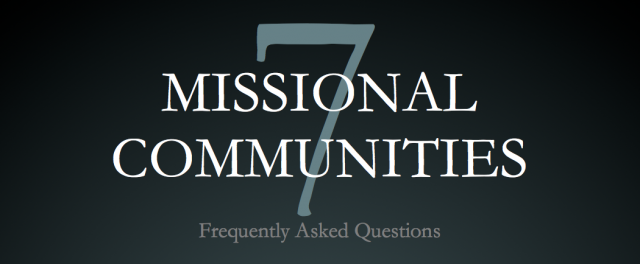Question 6: What Do Missional Communities Do?

If you’re new to the 7 Questions Series or just need to catch up, click here to learn about the series and recap previous articles, podcasts, and videos.
What Missional Communities Do
You can download a PDF of this post here: PDF
Missional communities will vary across contexts, but they must be rooted in gospel; identity first, then methods and theory. What we’ve found is that if Christians love the gospel, they’ll be willing to do incredible things for the sake of making Jesus known to those around them. At The Austin Stone, we are playing this out in both groups from traditional bible studies (see recap of Question 4) and groups being launched as missionary teams into the harvest.
Our methods come from our ultimate aim of conformity to the life of Jesus, not necessarily to a certain pattern or formula for Christian living. Our target in sanctification must be determined by our Christology – basically, “What is Jesus like?” Traditional American piety typically aims at developing the inner life and leaving the outer life to church events. We’re trying to lead our MCs to grow both inwardly and outwardly as a group.
As we look at Scripture and also at how our people are wired, we’ve conceived of a few simple practices that have been especially helpful for groups that are transitioning from a Bible study or small group mentality. Each is an expression of what a MC should be doing in the natural rhythms of life.
For the outward focus of our groups (the missional part of missional community), there are two primary practices we suggest:
– Regularly engaging in a 3rd Place, somewhere neutral and natural that your group regularly gathers to enjoy each other and cultivate what Hugh Halter calls “inclusive community.”
– Seeking opportunities for Service, which happens when groups seek opportunities to meet the needs of and bless people in their pocket of town or around the city. In other words, serving the least of these.
As we engage one another in these places, we prayerfully and intentionally start inviting our lost friends to join us and provide space for them to belong before they believe. In this way, the community apologetic is beginning to be lived out through creating a natural place where those outside the community of faith can meaningfully experience the life of Christ lived out amongst those who believe in Christ.
For the inward focus of our groups (the community part of missional community), there are two primary things we ask of our groups:
– Rather than depending on professionals, we want groups pastoring each other in the mess of life. This is really just a function of believers on mission living more life together. Depending on the situation, we may need to comfort, rebuke, encourage, forgive, etc. This isn’t always easy, but we see the gospel on display as group members begin to die to self and love each other more.
– Finally, we’re often asked the question “where do I go deep?” LTG’s (Life Transformation Groups) are something you’ll recognize from Neil Cole. LTG’s are groups of 2 or 3 people committed to confession, Scripture, and praying for lost friends. This is the place for important high-bar personal depth, and accountability to discipleship that is based on our obedience, not simply growth in knowledge.
Finally, we value a regular Missional Community Meeting that serves both the outward and inward depth. It’s a time for the group to share a meal together and hold a “low-bar”–no minimum amount of Bible or theology required to participate in meaningful discussion–Bible study. We hope that the relationships we cultivate with those far from God would make this their next step with us toward consistent engagement with the life of our community.
As we have begun to live these practices out, we become more convinced there is no magic formula. These are simply tools for groups to use, not to measure themselves by. We have seen, however, that as these practices are adopted within groups, the mission will enrich the community and the community will reinforce the mission.
Matt Carter serves as the Pastor of Preaching and Vision at The Austin Stone Community Church, which has been tremendously blessed since the church began in 2002. Matt’s desire to see the church become an advocate for the welfare of the city of Austin has led to the creation of a network that exists to actively pursue the redemption and renewal of the city for the advancement of the Gospel. The For the City Network provides a platform for organizational collaboration by providing physical space to local non-profits as well as creating a funnel for volunteer engagement. In addition to pastoring at The Austin Stone, Matt is a cancer survivor, co-author of the upcoming book For the City and speaker for camps and conferences nationwide. Twitter: @_matt_carter.



